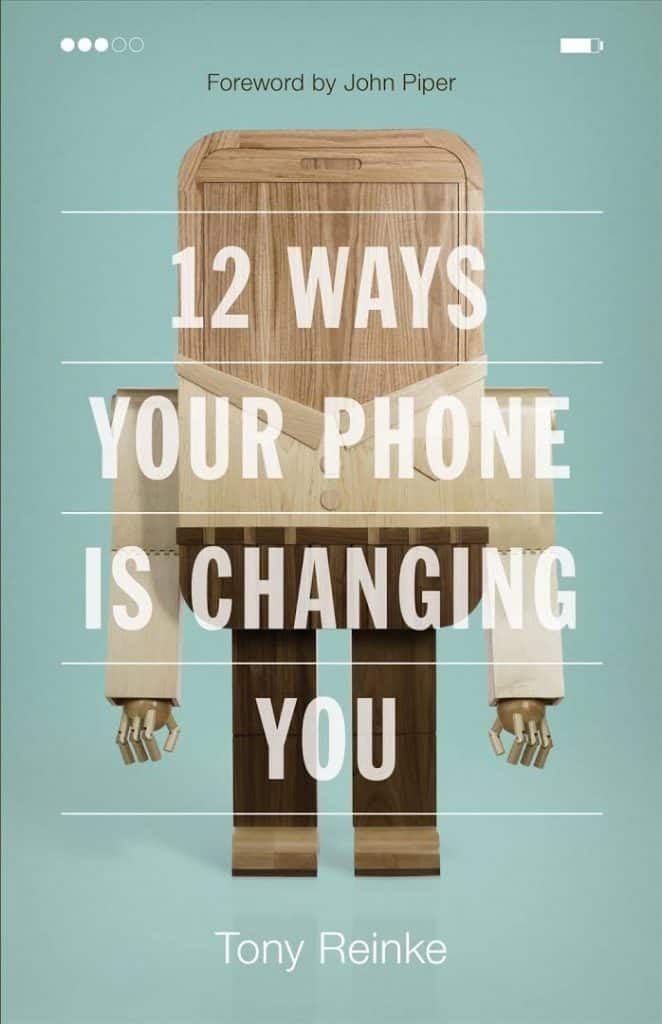⏱️ Estimated Reading Time: 5 min read
Tony Reinke did not convince me to trade my smartphone for a dumbphone in his new book 12 Ways Your Phone is Changing You. This is not his purpose. His overall aim is to “avoid both extremes: the utopian optimism of the technophiliac and the dystopian pessimism of the technophobe” (20). Neither does he aim to tell me specifically what to do with my phone. Instead, he explores why I would consider giving it up or taking breaks from it.
Moreover, the book asks the question: What is the best use of your smartphone in the flourishing of your life? Depending on how you evaluate your smartphone use after reading this book, it may convince you to ditch it after all. For me, this was not the case. I suggest you evaluate your phone use in reading this book and let Reinke, with his expert research and Christian worldview, stir you to develop disciplines to improve your digital habits which will help you best maximize your usefulness for His glory.
How the Book Has Already Affected Me
The morning after I finished Reinke’s book, I tweeted more frequently than usual. It just so happened to be Marathon Monday—the day of the Boston Marathon. Running is my favorite sport as a former collegiate cross country and track and field runner, and I thoroughly enjoy live tweeting during big running events. Another thing that I enjoy doing is sharing the gospel of Jesus Christ. In the digital age, there are many ways to engage people with the gospel in our online presence. By using the hashtag “Boston Marathon,” people who would not typically visit my profile perhaps did, and in visiting it, they saw many links to gospel-centered articles or conversations.
By watching the marathon and tweeting simultaneously, I distracted myself from other responsibilities for a few hours. Reinke claims we become more displaced spiritually the more distracted we are digitally (51). This is true, however, given the fact I did my spiritual disciplines (Bible reading, meditation, and prayer) before watching the marathon, I felt okay enjoying an allotted amount of time engaging in a trending topic while having a prayerful mindset to guide others into a gospel-saturated feed. In chapter one, Reinke gives ten diagnostic questions to ask of your smartphone habits and sums up with, “The key is to move from being distracted on purpose to being less and less distracted with an eternal purpose” (52). Because of this book, I cautiously examined each tweet on this exceptional twitter-filled morning longing to not say anything that would not edify another (particularly an elite runner I am not a fan of). Once the race was over, I stepped away from Twitter to prepare a Bible study and care for my home. Throughout the day, I went over three questions of self-critique that Reinke gave on page 194:
- Ends: Do my smartphone behaviors move me toward God or away from him?
- Influence: Do my smartphone behaviors edify me and others, or do they build nothing of lasting value?
- Servitude: Do my smartphone behaviors expose my freedom in Christ or my bondage to techniques?
How I Want the Book to Affect Me
I want to wake up every morning and open my Bible before ever looking at my phone. Reinke suggests a real, battery operated alarm clock to help with this. He also encourages changing your phone settings to mute notifications between one hour before bedtime and the time you expect to be done with personal disciplines in the morning.
I want to dedicate one day a week as a digital sabbath where I am completely offline and see how it affects my prayer life and dependency on God. I want to enjoy more actual moments with my eight-month-old by watching her with my own eyes and not through my smartphone video camera. I want to take heed that God will judge every idle word—even my private text arguments (Matt. 12:36). Reinke quotes David Powlison, “God will judge our digital conversations, private texts, and public tweets by the intention of our hearts” (184). I want to be active to love my neighbor (and my family) by heeding this warning:
The smartphone is causing a social reversal: the desire to be alone in public and never alone in seclusion. We can be shielded in public and surrounded in isolation, meaning we can escape the awkwardness of human interaction on the street and the boredom of solitude in our homes. Or so we think (124).
My Hope for Readers
I hope that anyone who reads this book will decide to use their smartphones in a manner worthy of God. Reinke says, “When we use our smartphones rightly, their shining screens radiate with the treasure of God’s glory in Christ, and in that glory-glow, we get a sneak peek into a greater age to come” (208). Our phones are not inherently evil, but they have no doubt changed us all. Reinke ever-so interestingly and compassionately lays out 12 ways of change—good and bad. May every Christian who owns a smartphone take their eyes off its glow long enough to gaze deeply into every page of this book and evaluate their digital-aged self, plan their digital use, and seek the main one worth seeking—our eternal, unchanging, life-changing, awesome God.



